人教版英语PEP五年级下第五单元复习资料全
新人教版五年级英语下册第五单元复习课程

人称代词
主格
宾格
I you she he we they
me you her him us them
物主代词
形容词性 物主代词
名词性物 主代词
my mine
your yours
her hers
his
his
our ours
their theirs
此课件下载可自行编辑修改,仅供参考! 感谢您的支持,我们努力做得更好!谢谢
It’s his dog. It’s his.
hers
her dog — hers
It’s her dog. It’s hers.
mine
my dog — mine
It’s my dog. It’s mine.
It's our dog. It's ours.
ours
our dog —ours
theirs
The book is mine.
(you and your partner) It’s our book.
The book is ours.
同桌合作,根据图片提示 做替换练习,重新编对话。
Pairwork
A: Whose pen is this? B: It’s mine. It’s my pen.
新人教版五年级英语下册第五单 元
Whose dog is it?
yours
Zoom's dog
Look! That’s my dog!
your dog — yours
Yes! It’s your dog. The dog is
yours.
Whose dog is it?
his
PEP五年级英语下册Unit1-6重点知识小结

Unit 1 This Is My Daydo morning exercises晨练eat breakfast吃早饭have english class上英语课play sports进行体育运动eat dinner吃晚饭when什么时候evening夜晚;晚上get up起床at在……点钟usually通常;一般noon中午climb mountains爬山go shopping购物;买东西play the piano弹钢琴visit grandparents看望祖父母go hiking去远足weekend周末often经常sometimes有时候话题1:日常生活时态:一般现在时1.When do you do morning exercises? 你什么时候做早操?I usually do morning exercises at 8:00. 我经常八点钟做早操。
(I usually get up at 12:00 at noon . 我经常在中午十二点起床。
) 2.When do you eat dinner ? 你什么时候吃晚餐?I eat dinner at 7:00 in the evening. 我在晚上七点种吃晚餐。
3.When is the best time to go to Beijing? Fall. 最好在什么时候去北京?秋天。
Unit 2 My Favourite Seasonspring春天summer夏天fall秋天winter冬天season季节which哪一个best最;极swim游泳fly kites放风筝skate滑冰make a snowman堆雪人plant trees种树why为什么because因为sleep 睡觉话题2:季节时态:一般现在时1.Which season do you like best ? I like spring best.(Spring.)你最喜欢是什么季节?我最喜欢春季。
Pep五年级英语下Unit5-6译文及作文辅导

Unit 5 Main scene迈克:嘿!这是谁的狗?陈杰:哦,是我的。
它在睡觉。
它很累。
子普:哇!多么漂亮的一幅画啊!是你的吗?祖姆:不是。
是他的。
约翰:那是什么?吴一凡:是只兔子。
它是我的。
约翰:我明白了。
它为什么在跳呢?吴一凡:它在和朋友们玩。
约翰:这些是谁的胡萝卜?吴一凡:这些胡萝卜是它们的。
A let’s talk陈杰:那幅黄颜色的画是我的。
这些都是我们的画吗?迈克:是的,它们是。
陈杰:哇!那幅北京的画漂亮。
它是谁的?迈克:是张鹏的。
陈杰:看!还有一幅上海的图画。
迈克:是一凡的。
陈杰:哦,是的!是他的。
Ask and find out萨拉:这些是谁的故事书?陈杰:是我的。
萨拉:这是谁的书?陈杰:是迈克的。
是他的。
Let’s learnIt’s our dog. The dog is ours.它是我们的狗。
这只狗是我们的。
Look!That’s my dog.瞧!那是我的狗。
Yes!It’s your dog. The dog is yours.是的!它是你的狗。
这只狗是你的。
B Let’s talk萨姆在陈杰家。
萨姆:菲多现在在哪儿?陈杰:它在厨房里。
萨姆:它在喝水吗?陈杰:不是。
它在吃东西。
萨姆:现在我能和它玩吗?陈杰:可以。
你能带她去公园吗?萨姆:当然!菲多,过来!菲多:汪汪,汪汪!Look and say萨姆:狗在吃东西吗?陈杰:不是。
它在……Let’s learn陈杰:哦,菲多在睡觉。
迈克:是的,它很可爱!陈杰:这些兔子在吃东西吗?迈克:不,他们在一起玩耍。
Read and write罗宾在动物园萨拉和罗宾在动物园。
罗宾很兴奋。
萨拉:你在这儿做什么,罗宾?罗宾:我在看熊。
我在像熊那样跳舞。
罗宾:我在看兔子。
我在像兔子那样吃东西。
罗宾:我在看老虎。
我在像老虎那样跑。
罗宾:我在看大象。
我在像大象那样走路。
罗宾:我在看猴子。
我在像猴子那样爬。
罗宾:我在看鸟。
我喜欢飞。
我想成为一只鸟!萨拉:罗宾,你想像鱼一样游泳吗?罗宾:不!不!我不想成为一条鱼!Let’s wrap it up1.埃米:那是谁的英语书?约翰:是怀特小姐的书。
新版PEP小学英语五年级下册Unit5单元总复习

Unit 5 Whose dog is it
复习课
Let’s sing
my my Our my my Our your your their your your their his his our his his our her her their her her their
Let's review
我 你 他 她
我们 你们 他们
的 的 的 的
的 的 的
+名词
It’s my card. It’s mine .
It’s his card. s The card is The card is . . It’s her card. s s It’s their classroom.
Let's learn
climb
爬
climbing Guessing
They are climbing.
Let's learn
eat 吃 Guessing eating
Look! The rabbit is eating.
Let's learn
drink Guessing
喝
drinking
Look! He is drinking.
doing do fly flying look looking walk walking read reading dance dancing run running swim swimming
climbing
Fido is climbing.
drinking
Fido is drinking.
Let's learn
PEP人教版五年级下册英语各单元知识要点总结大全

PEP人教版五年级下册英语各单元知识要点总结大全第一单元一、重点词汇eat breakfast 吃早餐have...class 上······课play sports 进行体育运动exercise 活动,运动do morning exercises 做早操eat dinner 吃晚饭clean my room 打扫我的房间go for a walk 散步go shopping 去购物take 学习,上(课)dancing 舞蹈take a dancing class 上舞蹈课a.m.上午p.m.下午usually 通常地二、其他日常活动get up 起床eat lunch 吃午饭go to bed 上床睡觉wash my face 洗脸wash my clothes 洗我的衣服watch TV 看电视play ping-pong 打乒乓球play the pipa 弹琵琶go swimming 去游泳go running 去跑步do homework 做作业do kungfu 练武术play football 踢足球play basketball 打篮球三、语音cl→[cl] :clean clock class clever pl→[pl] :plate e ggplant please play注意:cl 和pl 放在词尾与e 结合变为cle 和ple 时发音不同。
四、频度副词always 总是,一直(100%)usually 通常(80%)often 经常(60%)sometimes 有时(30%)五、疑问词why 为什么when 什么时候六、重点句型1、询问别人什么时候做某事的句型及回答。
句型结构:问:When do you+动词短语原形+其他?(你/你们什么时候做某事?)答:I/we(+频度副词)+动词短语原形+at+具体时间. (我/我们通常在几点做某事。
人教pep版五年级英语下册第五单元单元知识点整理
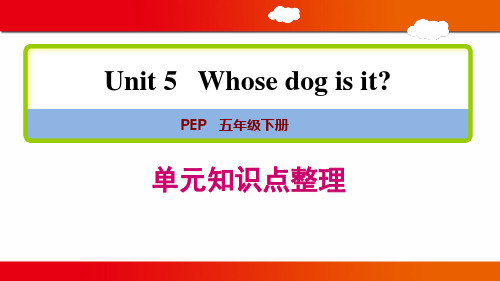
3. The math book is Mike's.(改为一般疑问句并做 肯定回答) _I_s_t_h_e_m__a_th__b_o_o_k_M__ik_e_'_s_________? _Y_e_s_,__i_t'_s_ __hi_s_.
back
1 复习本单元,背诵重点单词和句型。 2 写作文 :描述一下你的家庭成员晚饭后正在
__m__in_e_ __h_e_r_s _ _y_o_u_r_s_
2.他的 4.他/她/它们的 6.我们的
__h_i_s__ _t_h_e_ir_s_ __o_u_rs__
仿照例子填单词。
1.This is my book.
This is mine.
2.These are his pictures . 3.Those are her clothes. 5. It is their house . 6.They are our library.
三、读句子,按要求做题。 1. The lion is sleeping .(对划线部分提问)
__W__h_a_t _ __is__ the lion ___d_o_in_g___? 2. These are Tom's ball.(对划线部分问)
_W__h_o_s_e_b_a_l_l_a_re__th_e_s_e_?______
1.young
This ruler is long.
2.thank
I think you need some help.
3.sing
The tiger is sleeping.
4.drink
That flower is pink.
5.song
复习课件-五年级下册Unit5人教(PEP)(共15张PPT)

看一头大象。我正在像大象那样走路。
词句综合运用
一、Read and fill. 根据句意,用适当的代词填空。 1. A:Do you know the girl's name? B:Yes, _h_e_r__ name is Sally. The bike is _h_e_r_s_ . 2. A:Look! The red cap is Mr Wang's. B:Oh, _h_i_s__ cap is very cool! 3. A:Is this your book? B:No, m__i_n_e_ is on the desk.
1. I can ( jump , jumping). Look, I am ( jump , jumping ) like a rabbit. 2. My baby sister is ( sleep, sleeping ) in the bedroom. She can
( sleep , sleeping ) for a long time. 3. The tigers are ( eatting , eating) under a big tree. 4. A:What do you often ( do , doing ) on Sundays?
B:They are your little brother's. 2. A:The dog is cute. ___W__h_o_se__is__it_?___
B:It's Mike's.
3. A:Excuse me. __Is__th_e__T_-_sh__ir_t_y_o_u_r_s_?__ B:No, the T-shirt is not mine. It is Zhang Peng's.
人教PEP版五年级英语下册Unit 5知识点

4.— Is he drinking water? 他在喝水吗? — No, he isn’t. He’s eating. 不, 不是。他在吃东西。 解读: 现在进行时的基本结构是 be 动词 (am/is/are) + 现在分词。 举一反三: — Is the tiger running? 老虎在跑吗? — No, it isn’t. 不, 不是。 四、了解句型 1.Robin is excited. 罗宾非常兴奋。 解读: excited 意思是 “兴奋的”。一般用来修饰人。 2.I�����������������������������������������������������������������������������������������������������������������������������������������������������������������������������������������������������������������������������������������������������������������
Unit 5 Whose dog is it? 一、 核心词汇 1. 名词性物主代词: mine 我的 yours 你 (们) 的 his 他的 hers 她的 theirs 他们的; 她们的; 它 们的 ours 我们的 2. 动词: climbing (正在) 攀登; 攀爬 eating (正在) 吃 playing (正在) 玩耍 jumping (正在) 跳 drinking (正在)喝 (水) sleeping (正在) 睡觉 二、了解词汇 1. 单词:each 每一; 各个 other 其他 excited 兴奋的; 激动的 like 像…… 那样 2. 短语: each other 相互 三、核心句型 1.The yellow picture is mine. 那幅黄颜色的画是我的。 解读: 这是表达某物是某人的句型。 举一反三: This bag is hers. 这个包是她的。 2.Are these all ours? 这些都是我们的画吗? 解读: 这是询问某物是不是某人的一般疑问句。 举一反三: — Is the pencil yours? 这是你的铅笔吗? — Yes, it is. 是的。 3.— Whose is it? 它是谁的? — It’s Zhang Peng’s. 是张鹏的。 解读: 当表示物品的从属关系时用名词性物主代词或名词所有格来表示。 人称代词表
【精品】人教PEP版英语五年级下册第五单元Unit 5重要知识点归纳

Unit 5 Whose dog is it?一、核心词汇1.名词性物主代词: mine 我的yours 你(们)的his 他的hers 她的theirs 他们的;她们的;它们的ours 我们的2.动词: climbing (正在)攀登;攀爬eating (正在)吃playing (正在)玩耍jumping (正在)跳drinking (正在)喝(水) sleeping (正在)睡觉二、了解词汇1. 单词:each 每一;各个other 其他excited 兴奋的;激动的like 像……那样2. 短语: each other 相互三、核心句型1.The yellow picture is mine. 那幅黄颜色的画是我的。
解读:这是表达某物是某人的句型。
举一反三: This bag is hers. 这个包是她的。
2.Are these all ours? 这些都是我们的画吗?解读:这是询问某物是不是某人的一般疑问句。
举一反三: — Is the pencil yours? 这是你的铅笔吗?— Yes, it is. 是的。
3.— Whose is it? 它是谁的?— It’s Zhang Peng’s. 是张鹏的。
解读:当表示物品的从属关系时用名词性物主代词或名词所有格来表示。
人称代词表名称主格宾格形容词性物主代词名词性物主代词I(我)me(我)my(我的)mine(我的)you(你;你们)you(你;你们)your(你的;你们的)yours(你的;你们的)he(他)him(他)his(他的)his(他的) she(她)her(她)her(她的)hers(她的) it(它)it(它)its(它的)its(它的) we(我们)us(我们)our(我们的)ours(我们的)they[他(她;它)们]them[他(她;它)们]their[他(她;它)们的]theirs[他(她;它)们的]4.— Is he drinking water? 他在喝水吗?— No, he isn’t. He’s eating. 不,不是。
五年级下册英语人教版第五单元
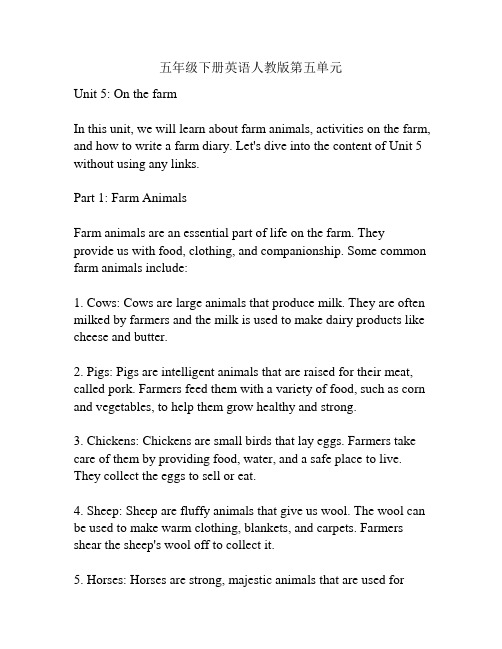
五年级下册英语人教版第五单元Unit 5: On the farmIn this unit, we will learn about farm animals, activities on the farm, and how to write a farm diary. Let's dive into the content of Unit 5 without using any links.Part 1: Farm AnimalsFarm animals are an essential part of life on the farm. They provide us with food, clothing, and companionship. Some common farm animals include:1. Cows: Cows are large animals that produce milk. They are often milked by farmers and the milk is used to make dairy products like cheese and butter.2. Pigs: Pigs are intelligent animals that are raised for their meat, called pork. Farmers feed them with a variety of food, such as corn and vegetables, to help them grow healthy and strong.3. Chickens: Chickens are small birds that lay eggs. Farmers take care of them by providing food, water, and a safe place to live. They collect the eggs to sell or eat.4. Sheep: Sheep are fluffy animals that give us wool. The wool can be used to make warm clothing, blankets, and carpets. Farmers shear the sheep's wool off to collect it.5. Horses: Horses are strong, majestic animals that are used fortransportation and work on the farm. They help farmers plow fields, carry heavy loads, and provide rides for people.Part 2: Farm ActivitiesFarms are busy places where many activities take place. Some common farm activities include:1. Planting: Farmers sow seeds into the soil to grow crops like corn, wheat, and vegetables. They water the plants regularly and protect them from pests and diseases.2. Harvesting: When the crops are ready, farmers harvest them. This involves cutting or picking the mature crops and collecting them to be used or sold.3. Feeding: Farmers feed animals on the farm to keep them healthy and strong. They give them a balanced diet consisting of grains, vegetables, and hay.4. Milking: Cows and goats are milked daily to collect milk. Farmers use a special machine called a milking machine or do it by hand.5. Cleaning: Farmers clean the barns, stables, and animal pens to maintain a clean and healthy environment for the animals.Part 3: Writing a Farm DiaryA farm diary is a book where farmers record their daily activitiesand observations on the farm. Here are some tips for writing a farm diary:1. Date your entries: Start each entry with the date and maybe even the day of the week.2. Write about the weather: Describe the current weather conditions such as sunny, rainy, or snowy. This will help you remember the conditions on your farm.3. Record daily activities: Write about the activities you performed on the farm that day, such as feeding animals, planting seeds, or milking cows.4. Include observations: Observe any changes or interesting events on the farm. For example, you might notice new flowers blooming or a baby animal being born.5. Reflect on your experiences: Share your thoughts and feelings about your work on the farm. This will give your diary a personal touch.Remember, the farm diary is your record of life on the farm, so be detailed and creative in your writing.Conclusion:In Unit 5, we have explored farm animals, activities on the farm, and the process of writing a farm diary. By studying these topics,you will gain a better understanding of farm life and develop your English skills. Enjoy your journey on the farm!。
五年级下册英语 5单元
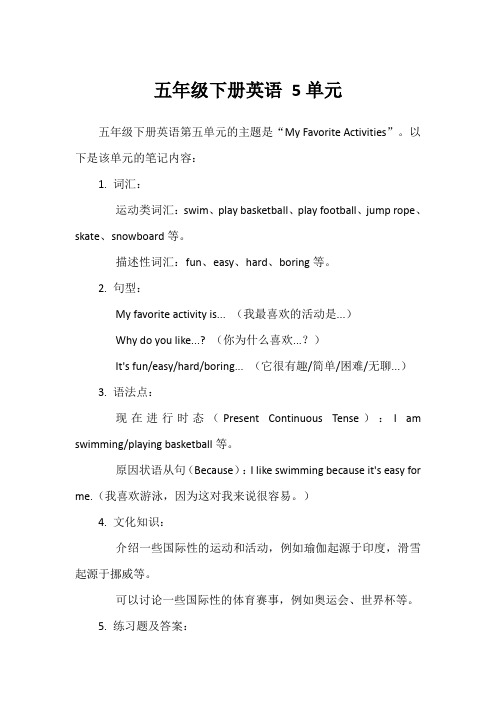
五年级下册英语5单元五年级下册英语第五单元的主题是“My Favorite Activities”。
以下是该单元的笔记内容:1. 词汇:运动类词汇:swim、play basketball、play football、jump rope、skate、snowboard等。
描述性词汇:fun、easy、hard、boring等。
2. 句型:My favorite activity is... (我最喜欢的活动是...)Why do you like...? (你为什么喜欢...?)It's fun/easy/hard/boring... (它很有趣/简单/困难/无聊...)3. 语法点:现在进行时态(Present Continuous Tense):I am swimming/playing basketball等。
原因状语从句(Because):I like swimming because it's easy for me.(我喜欢游泳,因为这对我来说很容易。
)4. 文化知识:介绍一些国际性的运动和活动,例如瑜伽起源于印度,滑雪起源于挪威等。
可以讨论一些国际性的体育赛事,例如奥运会、世界杯等。
5. 练习题及答案:选择题:1. My favorite activity is _______.A. play soccerB. playing soccerC. played soccerD. it's fun to play soccer答案:B解析:动名词短语作主语表示经常性、习惯性的动作,符合题意。
2. Why do you like _______?A. runB. runningC. runsD. to run答案:B解析:动名词短语作宾语表示经常性、习惯性的动作,符合题意。
因此选项B为正确答案。
人教pep英语五年级下册unit5大单元整体教学
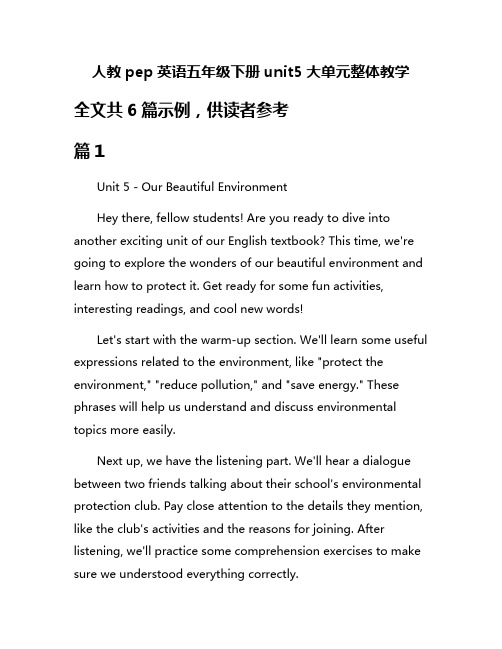
人教pep英语五年级下册unit5大单元整体教学全文共6篇示例,供读者参考篇1Unit 5 - Our Beautiful EnvironmentHey there, fellow students! Are you ready to dive into another exciting unit of our English textbook? This time, we're going to explore the wonders of our beautiful environment and learn how to protect it. Get ready for some fun activities, interesting readings, and cool new words!Let's start with the warm-up section. We'll learn some useful expressions related to the environment, like "protect the environment," "reduce pollution," and "save energy." These phrases will help us understand and discuss environmental topics more easily.Next up, we have the listening part. We'll hear a dialogue between two friends talking about their school's environmental protection club. Pay close attention to the details they mention, like the club's activities and the reasons for joining. After listening, we'll practice some comprehension exercises to make sure we understood everything correctly.Then, it's time for the reading section! We'll read a fascinating article about a group of students who started a recycling project at their school. Imagine turning all those empty bottles and cans into something useful! As we read, we'll learn new vocabulary words like "recycle," "waste," and "sustainable." We'll also practice some reading comprehension skills by answering questions about the main idea, details, and vocabulary.But that's not all! In the speaking section, we'll have a chance to roleplay different situations related to environmental protection. For example, we might pretend to be members of the recycling club, trying to convince our classmates to join. Or we could act out a conversation between a parent and a child, discussing ways to save energy at home. These activities will help us practice our speaking skills while also learning important environmental lessons.The writing part is where we'll put our new knowledge into practice. We might write a letter to the school principal, suggesting ideas for making our school more eco-friendly. Or we could create a poster to raise awareness about the importance of reducing waste. Whatever the task, we'll learn how to organize our thoughts and express them clearly in writing.Throughout the unit, we'll also encounter fun activities and games related to the environment. For instance, we might play a memory game to review vocabulary words or participate in an environmental quiz to test our knowledge. These engaging activities will make learning even more enjoyable!But it's not just about the book. We'll also have the opportunity to participate in hands-on projects and field trips. Imagine visiting a local recycling center or organizing a school cleanup event. These real-life experiences will help us understand the importance of environmental protection in a practical way.By the end of this unit, we'll have gained a deeper appreciation for our beautiful environment and the role we can play in protecting it. We'll have improved our English skills in listening, speaking, reading, and writing, all while learning valuable lessons about sustainability and eco-friendliness.So, let's dive in and explore the wonders of Unit 5! Get ready to have fun, learn new things, and become environmental champions. Our planet needs us, and we're ready to make a difference!篇2Unit 5 – Our NeighborsHi there! I'm really excited to tell you all about Unit 5 in our PEP English textbook. This unit is called "Our Neighbors" and it's been a blast learning about different countries and cultures around the world.We started off by reading a fun story called "A Foreigner in China". It's about a French lady named Marie who comes to visit China. She experiences so many new things like trying delicious Chinese food, watching an amazing acrobatics show, and even learning some Mandarin phrases. My favorite part was when Marie got lost in the Forbidden City and had to ask for directions.I can totally relate to getting lost and confused in new places!After the story, we learned a ton of cool vocabulary words related to different countries and cultures. Words like "customs", "traditions", "foreigners", and "tourists". My teacher had us play this awesome game where we acted out the words using movements and expressions. It was hilarious watching my friend Danny pretend to be a confused tourist!Then we moved on to the next part which was all about festivals and celebrations from around the globe. We read about Diwali in India, Brazil's Carnival, the Dragon Boat Festival in China, and so many more. I loved learning the stories and myths behindeach festival. The Dragon Boat Festival story about Qu Yuan was my favorite. We even got to make our own little dragon boats out of paper and see whose boat could float the furthest in the sink!The grammar sections helped us practice using words like "national", "international", and "traditional" correctly in sentences. We did tons of fun activities like unscrambling sentences, writing postcards from different countries, and my teacher even brought in snacks from various cultures for us to try. The Thai mango sticky rice was delicious!For the reading part, we read all sorts of interesting passages about different countries' food, dress, music, and daily life. My best friend Aaron's family is from Korea, so I really enjoyed the reading about Korean culture. We also learned how to look up facts from books and websites to prepare cultural presentations. My group did our presentation on Indian culture and we dressed up in colorful Indian clothes that my teacher brought in!The writing section had us practice words for comparing and describing different customs and traditions. We wrote journal entries, emails to penpals, and even short stories pretending we were visiting a foreign country. I wrote about getting lost in a bigcity and having to ask the locals for help using the phrases we learned. Writing the story was my favorite part!Overall, I think Unit 5 was awesome for helping us appreciate the amazing diversity of cultures around the world. I can't wait to learn about more festivals, stories, and traditions in the next unit. Now if you'll excuse me, I have to go practice my Dragon Boat racing skills!篇3Hooray for Unit 5! My Exciting AdventuresUnit 5 of our PEP English book was so much fun! We learned all about adventures, traveling, and exploring new places. I couldn't wait to dive into the unit and go on exciting journeys through the stories and activities.It all started with the warm-up section. Our teacher showed us pictures of people hiking, camping, and going on safaris. We talked about different kinds of adventures and shared our own dreams of places we'd love to visit someday. I raised my hand and said I want to go on an African safari to see lions, elephants, and giraffes up close!Then we jumped into the first lesson about a family trip to Australia. We read a funny story about a dad who got lost in the Outback and had to be rescued by his kids. I laughed so hard imagining my own dad wandering around the desert looking confused. The story taught us great vocabulary like "outback", "kangaroos", and "bushwalking."Next up was a lesson all about exploring rainforests. We learned how hot, humid, and densely packed with plants and animals they are. Our teacher showed us amazing photos of tall trees, vines, butterflies, and even venomous snakes! We practiced describing rainforest scenes and animals using vivid adjectives. I wrote about a brightly colored bird flitting through the thick green foliage.The middle of the unit focused on outdoor adventures like rock climbing, whitewater rafting, and skiing. Personally, rock climbing looks terrifying to me! But the pictures we saw of people hanging off sheer cliffs were incredible. We did some fun roleplays pretending to go on different adventures and encouraging each other not to give up. "You can do it! Just a little further to the top!"One of my favorite parts was the lesson on the Silk Road, an ancient trade route across Asia and Europe. We imagined beingmerchants transporting precious goods like silk, spices, and jade on the long, treacherous journey. We followed maps, learned about different cultures along the route, and picked vocabulary words we thought explorers would need to know, like "caravan" and "oasis."For the project at the end of the unit, we got to plan our own dream adventure anywhere in the world! I decided to go on an archaeological dig searching for dinosaur bones. I drew illustrations of digging up a huge T-Rex skeleton in the desert and mapped out my expedition across rugged terrain. Presenting my adventure to the class was both exciting and nerve-wracking.All throughout the unit, we played fun games introducing and reviewing the vocabulary and grammar. We raced to put scrambled sentences in the right order, had competitions thinking of more descriptive words than our opponents, and even did some fun travel-themed tongue twisters that kept tripping us up. "A hiker biker hiker took a bike for a hike…"Unit 5 wasn't all just reading, writing, and games though. We also learned invaluable life skills about perseverance, appreciating nature, respecting other cultures, and being prepared for challenges ahead. Our teacher reminded us that thegreatest adventures involve taking risks, stepping out of our comfort zones, and embracing new experiences with courage and curiosity.As we wrapped up the unit, I felt like a real explorer who had journeyed to the farthest corners of the globe and back again. My imagination was fuller, my English richer, and my spirit ready for whatever adventure comes next. Maybe I'll finally get to see those giraffes on an African safari someday! But for now, I've got plenty of other exciting units and journeys awaiting me in this PEP English book. Here's to many more adventures to come!篇4My Awesome English Class: Unit 5Hey there! It's me again, your friendly neighborhood 5th grader. Today I want to tell you all about the latest unit we're covering in English class. It's called "Unit 5: My Cyber Friend" and let me tell you, it's been a blast so far!First up, we learned a bunch of cool new words related to computers and the internet. Words like "web page", "download", "upload", "email", and "password". I feel like suc篇5Unit 5 - A Hobby to ShareHi there! I'm really excited to tell you all about the new unit we just started in our PEP English class. It's called "A Hobby to Share" and it's all about different hobbies that people enjoy. I think this unit is going to be super fun and interesting!We started off by learning some new vocabulary words related to hobbies. Some of the words were familiar to me like "paint", "draw", and "collect". But there were also some new words I didn't know before like "origami", "calligraphy", and "handicraft". Our teacher showed us pictures and real examples to help us understand what each hobby involves.After learning the vocab, we did a fun activity where we had to match different tools and materials to the correct hobby. For example, we matched a paintbrush to painting, colored pencils to drawing, and folded paper to origami. It was a little tricky at first but became easier once we practiced more.Then we listened to a dialogue between two students talking about their hobbies. One student liked doing origami and taught his friend how to make a simple origami shape. The other student was really into collecting stamps and coins. I thought it was neat how they shared their interests with each other. It made me want to learn more about different hobbies too!Next up, we read a short passage about a girl named Lucy who loved handicrafts like sewing, knitting, and making jewelry. The reading talked about the different materials she used and some of the cool things she had made. After reading it, we had to answer some comprehension questions about the main idea, details, and vocabulary words from the passage.One of my favorite parts so far was when our teacher brought in examples of handicrafts made by local artisans. There were beautifully embroidered cloths, woven baskets, handmade pottery, and carved wooden figures. She let us carefully examine everything and taught us about the different techniques used. Seeing all the intricate handmade items really made me appreciate the skills involved in handicrafts.We also learned how to write a short paragraph describing our own hobbies or a hobby we'd like to try someday. I wrote about how I'm interested in learning calligraphy because I love the stylish look of beautifully written words and letters. Some of my classmates wrote about hobbies like skating, playing basketball, coding games, and more. It was fun reading about all the different interests we have.For our unit project, we have to make a short video introducing a hobby to the rest of the class. We can filmourselves doing the hobby, interview someone who's really good at it, or just explain the basics using props and visuals. I'm planning to make my video about photography since I've recently gotten into taking pictures with my mom's old camera. I'll show some of my favorite photos I've taken and explain basic tips like lighting, angles, and editing.Overall, I'm really enjoying this unit so far! It's giving me a chance to explore new potential hobbies while also sharing my own interests. I'm looking forward to watching all my classmates' videos and maybe even picking up a new hobby or two after this unit. Learning about different hobbies is a great way to appreciate the diversity of talents and pastimes people have. I can't wait to see what else we'll do!篇6Unit 5: My HobbiesHello, my dear friends! Today, let's talk about our hobbies. Hobbies are the things we love to do in our free time. They make us happy and help us relax. In Unit 5, we will learn about different hobbies and how to talk about them in English.Lesson 1: What's Your Hobby?In this lesson, we will learn how to ask and answer the question "What's your hobby?" We will also learn some common hobbies like drawing, swimming, singing, and dancing. Let's practice!Teacher: "Hello, everyone! What's your hobby?"Students: "My hobby is drawing."Teacher: "That's great! Who else has a hobby?"Students: "I like swimming!"Teacher: "Good job! What about you?"Students: "I love singing!"Teacher: "Wonderful! And what's your hobby?"Students: "I enjoy dancing!"Teacher: "Fantastic! Now, let's all say our hobbies together. Ready?"Students: "Drawing, swimming, singing, dancing!"Lesson 2: Let's Talk About HobbiesIn this lesson, we will learn how to talk about our hobbies in more detail. We will use sentences like "I like drawing becauseit's fun" or "I enjoy swimming because it keeps me healthy." Let's practice!Teacher: "Now, let's talk about our hobbies in more detail. Who wants to start?"Student 1: "I like drawing because it's fun."Teacher: "Great sentence! Who's next?"Student 2: "I enjoy swimming because it keeps me healthy."Teacher: "Well said! Anyone else?"Student 3: "I love singing because it makes me happy."Teacher: "Excellent! And what about you?"Student 4: "I enjoy dancing because it's a great way to express myself."Teacher: "Fantastic job, everyone! Keep it up!"Lesson 3: My Favorite HobbyIn this lesson, we will learn how to talk about our favorite hobby and explain why we like it the most. We will use sentences like "My favorite hobby is drawing because I can be creative." Let's practice!Teacher: "Now, let's share our favorite hobbies and why we like them the most. Who wants to go first?"Student 1: "My favorite hobby is drawing because I can be creative."Teacher: "Wonderful! Who's next?"Student 2: "My favorite hobby is swimming because I love being in the water."Teacher: "Great choice! Anyone else?"Student 3: "My favorite hobby is singing because I enjoy performing for others."Teacher: "Fantastic! And what about you?"Student 4: "My favorite hobby is dancing because it's so much fun and I can dance with my friends."Teacher: "Amazing answers, everyone! You all did a fantastic job!"ConclusionIn Unit 5, we learned how to talk about our hobbies in English. We practiced asking and answering the question "What's your hobby?" We also learned how to talk about ourhobbies in more detail and shared our favorite hobbies. I hope you had fun learning about hobbies with me!Remember, hobbies are important because they bring us joy and help us relax. What's your favorite hobby? Why do you like it? Keep exploring new hobbies and never stop doing what you love!That's all for today. See you next time for more exciting English lessons! Goodbye, my dear friends!。
(完整版)人教版PEP五年级下册英语知识点复习总结
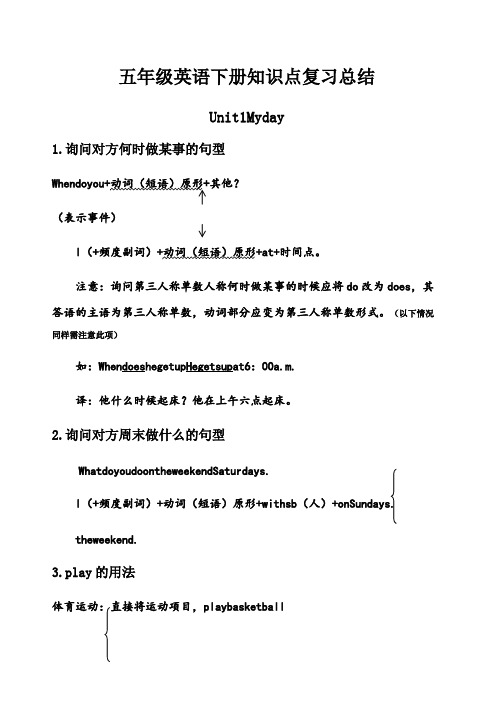
五年级英语下册知识点复习总结
Unit1Myday
1.询问对方何时做某事的句型
Whendoyou+动词(短语)原形+其他? (表示事件)
I(+频度副词)+动词(短语)原形+at+时间点。 注意:询问第三人称单数人称何时做某事的时候应将 do 改为 does,其 答语的主语为第三人称单数,动词部分应变为第三人称单数形式。(以下情况
同样需注意此项)
如:WhendoeshegetupHegetsupat6:00a.m. 译:他什么时候起床?他在上午六点起床。
2.询问对方周末做什么的句型
WhatdoyoudoontheweekendSaturdays. I(+频度副词)+动词(短语)原形+withsb(人)+onSundays. theweekend.
(2)在基数词后加 th:除去 first,second,third,其他基数词变序数词一般 直接在其后加 th。注意 five 与 twelve 要先把 ve 变 f,再加 th;eight 直接加 h;nine 去 e 再加 th。
(3)整十序数词以 ieth 结尾:整十位的序数词先将十位整数词尾的 y 变为 i, 再加 eth。如:twenty-twentieth。
The
注意:play-plays 因为 a 是元音 3)以 ch,sh,s,x 或 o 结尾的动词,在后面加-es; 例如 teach-teacheswash-washesdo-doesgo-goesfix-fixes
4)不规则的; 例如 have-has
5.by 的用法
PEP全册五年级英语复习资料
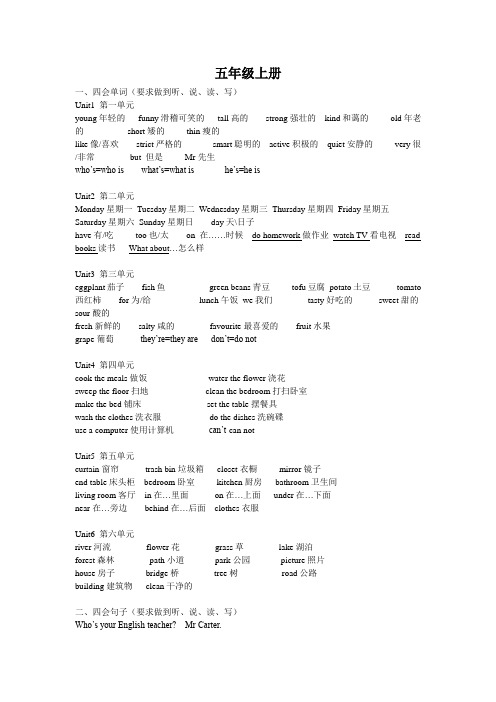
五年级上册一、四会单词(要求做到听、说、读、写)Unit1 第一单元young年轻的funny滑稽可笑的tall高的strong强壮的kind和蔼的old年老的short矮的thin瘦的like像/喜欢strict严格的smart聪明的active积极的quiet安静的very很/非常but 但是Mr先生who’s=who is what’s=what is he’s=he isUnit2 第二单元Monday星期一Tuesday星期二Wednesday星期三Thursday星期四Friday星期五Saturday星期六Sunday星期日day天\日子have有/吃too也/太on 在……时候do homework做作业watch TV看电视read books读书What about…怎么样Unit3 第三单元eggplant茄子fish鱼green beans青豆tofu豆腐potato土豆tomato 西红柿for为/给lunch午饭we我们tasty好吃的sweet甜的sour酸的fresh新鲜的salty咸的favourite最喜爱的fruit水果grape葡萄they’re=they are don’t=do notUnit4 第四单元cook the meals做饭water the flower浇花sweep the floor扫地clean the bedroom打扫卧室make the bed铺床set the table摆餐具wash the clothes洗衣服do the dishes洗碗碟use a computer使用计算机can’t-can notUnit5 第五单元curtain窗帘trash bin垃圾箱closet衣橱mirror镜子end table床头柜bedroom卧室kitchen厨房bathroom卫生间living room客厅in在…里面on在…上面under在…下面near在…旁边behind在…后面clothes衣服Unit6 第六单元river河流flower花grass草lake湖泊forest森林path小道park公园picture照片house房子bridge桥tree树road公路building建筑物clean干净的二、四会句子(要求做到听、说、读、写)Who’s your English teacher? Mr Carter.谁是你的英语老师?卡特先生。
人教版小学五年级英语下册U5复习课件

theirs 他们的;她们的;它们的__________________
我们的___________ ours
eating 正在吃___________ jumping 正在跳_____________
正在攀爬____________ climbing playing 正在玩耍____________
—No, he isn’t. He is eating. 不,不是。他在吃东西。
3. The yellow picture is mine. 那幅黄颜色的画是我的。 4. I like flying. 我喜欢飞。
任务三:看例子,说语法,学解题 (听老师讲例句,然后做下一页习题,全对可得2分) The yellow bag is mine. (对划线处提问)
解析:如果物主代词在句首,可以直接改为whose, 可得出答案:Whose classroom is on the first floor? 3. She is my teacher. 解析:此句意思是“她是我的老师” ,对“我的老 师” 提问,应该用Who+一般疑问句?可得出答案: Who is she? 区分who(谁)与whose(谁的)
对划线处提问 1. This shirt is my brother’s. 解析: 根据句型结构Whose+名词+一般疑问句? 或者Whose+名词+一般疑问句?可得出答案: Whose shirt is this? \ Whose is this shirt?
2. Our classroom is on the first floor.
2. 若名词已有复数词尾-s ,只加’,如:the workers’
caps工人们的帽子.
Unit5(复习课件)五年级英语下学期(人教PEP版)

Yes! It’s _h_e__ dog.The dog is _h_e_r_s _. r
ours /'auəz/
his
___W__h_o_s_e__d_o_g__is__t_h_a_t___?
It’s _o_u_r_d_o_g_.The dog is __o_u_rs__.
theirs /ðeəz/
Look, that’s my dog!
his
It’s your dog.The dog is yours.
drink
ing形式
drinking
his
He is thirsty. He’s drinking now.
climb
his
He wants to have fun.
ing形式
He’s climbing.
___H_e_r_e__c_o_m__e_s_a__t_ig_e_r_!_______ 我不知道:
___I_d_o__n_’t_k__n_o_w_!_____________ 一起玩耍:_p_l_a_y_w__it_h__e_a_c_h__o_t_h_e_r_ 一幅美丽的画: ___a__b_e_a_u_t_i_f_u_l _p_a_i_n_t_in_g_______ 听音乐:___l_is_t_e_n__t_o_m__u_s_i_c___ 读书:___r_e_a_d__b_o_o_k_s_______
climbing
eat
ing形式
eating
his
I’m eating now.
sleep
ing形式
his
Shh… Be quiet! They are sleeping.
sleeping
2021春五年级下英语(PEP版)人教版知识点总结
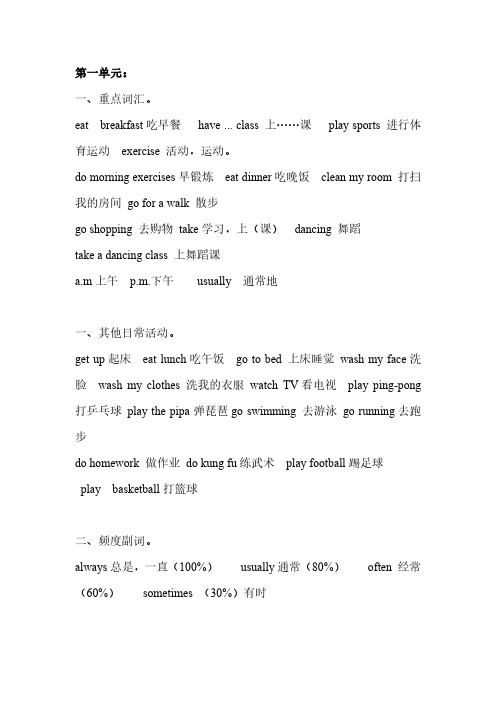
第一单元:一、重点词汇。
eat breakfast吃早餐have ... class 上……课play sports 进行体育运动exercise 活动,运动。
do morning exercises早锻炼eat dinner吃晚饭clean my room 打扫我的房间go for a walk 散步go shopping 去购物take学习,上(课)dancing 舞蹈take a dancing class 上舞蹈课a.m上午p.m.下午usually 通常地一、其他日常活动。
get up起床eat lunch吃午饭go to bed 上床睡觉wash my face洗脸wash my clothes 洗我的衣服watch TV看电视play ping-pong 打乒乓球play the pipa弹琵琶go swimming 去游泳go running去跑步do homework 做作业do kung fu练武术play football踢足球play basketball打篮球二、频度副词。
always总是,一直(100%)usually通常(80%)often 经常(60%)sometimes (30%)有时三、疑问词。
when什么时候why 为什么四、重点句型。
1、询问别人什么时候做某事的句型及回答。
句型结构:问:When do you+动词短语原形+其他?(你/你们什么时候做某事?)答:I/we(+频度副词)+动词短语原形+at+具体时间(我/我们通常在几点做某事。
)例:问:When do you go to bed?(你什么时候上床睡觉?)答:I go to bed at 9:00 p.m (我晚上9点上床睡觉。
)注意:当主语是第三人称单数(he,she,it,单个人名或单数名词)时,助动词do要变成does,句型结构是:whendoes+主语(第三人称单数)+ 动词短语原形+其他?2、询问别人周末做什么的句型及回答。
- 1、下载文档前请自行甄别文档内容的完整性,平台不提供额外的编辑、内容补充、找答案等附加服务。
- 2、"仅部分预览"的文档,不可在线预览部分如存在完整性等问题,可反馈申请退款(可完整预览的文档不适用该条件!)。
- 3、如文档侵犯您的权益,请联系客服反馈,我们会尽快为您处理(人工客服工作时间:9:00-18:30)。
芝士英文工作室PEP五年级英语下册
第五单元复习资料
By Jessica Zhang 一、重点词汇。
climb the tree 爬树 play football 踢足球
a beautiful painting 一幅美丽的画look at 看
in the kitchen在厨房 play with each other一起玩耍
drink water 喝水listen to music 听音乐
read books读书
动词ing形式:
climbing (正在)攀爬eating(正在)吃playing (正在)玩
jumping(正在)跳drinking(正在)喝sleeping (正在)睡觉
PS:swim----swimming
少数几个以
ie结尾的动
词,变ie为y,再加-ing lie→lying(躺,撒谎)die→dying(死)
tie→tying(系,捆绑)
口诀记忆:动词-ing很好记,一般情况直接加。
词尾若有哑音e,去e再加-ing。
“一辅重闭”作尾巴,双写后加-ing。
还有一点要注意,ie变y再加-ing。
mine我的 your 你的,(你们的)his 他的hers 她的theirs 他们的,她们的 ours 我们的
人称代词:目前只是作为了解。
不要求背诵
名词性物主代词&形容词物主代词
第一人称第二人称第三人称
形容词性物主代词my
我的
our
我们的
your
你的,你们的
his/her/its
他的/她的/它的
their
她们的,他们的,它们的
名词性物主代词
mine ours yours his/hers/its theirs
P.S:
1、形容词性物主代词相当于一个形容词,不能单独使用,后面需要跟名词,常用来修饰、限定后面的名词。
如:This is my book(这是我的书)、That is his bag(那是他的书包)
2、名词性物主代词需独立使用,后面不能跟名词,它相当于“形容词性物主代词+名词”。
如:It’s mine.(它是我的)
二、日常句型
1、What are you doing?你正在干什么?
I am doing the dishes.我正在洗碗碟。
2、常见电话用语:
Who's that?谁啊? 用来问对方是谁,不能说成:Who are you?
Can l speak to ……?
Please hold on.
There is a call for you.有一个电话找你。
It's Chen Jie.我是陈洁。
(打电话用语)用来介绍自己。
也可以说= This is Chen Jie=This is Chen Jie speaking.
千万不能说成:I am Chen Jie.
三、知识点
1、现在进行时
What are you doing?你正在干什么?
I am doing the dishes.我正在洗碗碟。
现在进行时: 表示正在进行或发生的动作,常见的搭配有:now,Look! Listen!
标志:be(am/are/is) +动词的ing形式。
例如:I am drawing pictures.我正在画画。
She is cooking dinner.她正在做饭。
They are reading books.他们正在看书。
句型回答:
⑴What are you doing? I’m ....
What is he doing? He is ...
What is she doing? She is...
What are they doing? They are ...
⑵Is he sleeping? Yes, he is. / No, he isn’t.
Is she sleeping? Yes, she is. / No, she isn’t.
Are they sleeping? Yes, they are. / No, they aren’t.
2、询问物品的归属
Whose(+物品)+are there/those? (这些/那些是谁的?)They are...
例:Whose pens are these? (这些钢笔是谁的?)
They are mine.(它们是我的)。
3、如要询问单个物品的归属的句型结构是:
Whose(+物品)+is it/this/that? (它/这/那是谁的?)
It’s...
例:Whose dog is it? It’s hers/ his/ theirs/ its.
Are these+...?
Yes,they are/No,they aren’t.
例:The Chinese book is mine. (这本语文书是我的。
)Are these all yours? (这些书都是你的吗?)No,they aren’t. (不,它们不是)
六、语音
ng/ ŋ/ long sing ring young
nk / ŋk/ think ink trunk pink。
